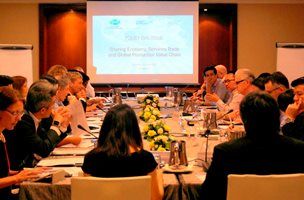 The Pacific Economic Cooperation Council (PECC) in cooperation with the APEC Business Advisory Council (ABAC) organized a policy dialogue on behalf of the APEC Group on Services to explore the ways in which technology is changing how companies deliver services; and the way in which the policy and regulatory environments in which these companies operate need to respond to these changes.
The Pacific Economic Cooperation Council (PECC) in cooperation with the APEC Business Advisory Council (ABAC) organized a policy dialogue on behalf of the APEC Group on Services to explore the ways in which technology is changing how companies deliver services; and the way in which the policy and regulatory environments in which these companies operate need to respond to these changes.
Watch video from the workshop (YouTube)
The event brought together entrepreneurs in the technology sector with regulators, policy-makers and experts to understand the opportunities brought by the digital revolution and how to expand services trade and investment.
The purpose of the Workshop was to:
• Understand how changes in technology are opening up new markets for services, as well as goods;
• Consider the extent of opportunities for business to expand trade by utilizing new technologies;
• Consider the cross-cutting nature of the digital economy and consider government policy reforms to maximize the benefits of technology for services trade.
The discussions were shaped around the following key questions:
- How is technology changing business models?
- What is the policy response to the changing business models and landscape brought by disruptive technologies?
- How are these changes going to impact the next generation trade agreements?
Summary of discussions
Technology is having a profound impact on business models, through enhanced connectivity and the digitalization of value. On the revenue side, businesses are able to immediately access the international market. Cost structures are also changing, sharing economy business models are less about recouping fixed cost but increasingly about operational expenditures. These developments open up opportunities for more inclusive growth but benefitting from these changes requires a mindset shift.
Furthermore, the ability of people to benefit from this process depends on both physical and institutional connectivity – absent the digital infrastructure and regulatory equivalence, the risk is that new digital divides will open up.
A major question is whether existing international policy frameworks are sufficient for addressing the cross-border aspects of this opportunity. Four major points emerged from the dialogue:
• The existing frameworks relying on geopolitical boundaries are not compatible with the direction that the digital landscape is moving, e.g. cryptocurrencies and distributed shared data storage.
• The issues confronting businesses are decreasingly at-the-border and increasingly behind-the-border issues – regulations. Economies have different approaches to regulations derived from historical, cultural and institutional settings; there is a need to shift thinking from one solely based on risk management to one of enabling opportunity.
• The speed of technological change and adoption require policy makers and regulators to move equally fast.
• International trade policy needs to take into account sub-national frameworks where regulations are implemented.
Program agenda
Download the summary of discussions (191KB)

 The Pacific Economic Cooperation Council (PECC) in cooperation with the APEC Business Advisory Council (ABAC) organized a policy dialogue on behalf of the APEC Group on Services to explore the ways in which technology is changing how companies deliver services; and the way in which the policy and regulatory environments in which these companies operate need to respond to these changes.
The Pacific Economic Cooperation Council (PECC) in cooperation with the APEC Business Advisory Council (ABAC) organized a policy dialogue on behalf of the APEC Group on Services to explore the ways in which technology is changing how companies deliver services; and the way in which the policy and regulatory environments in which these companies operate need to respond to these changes.